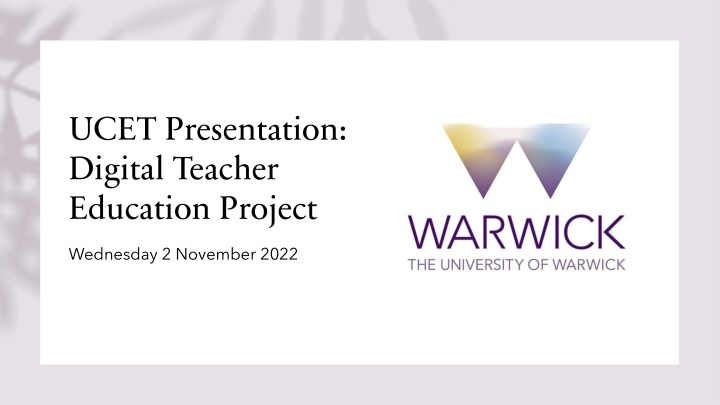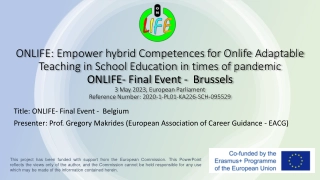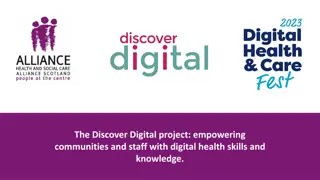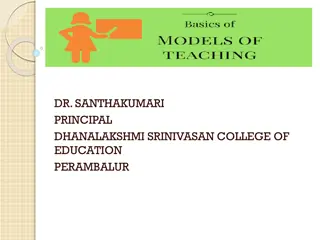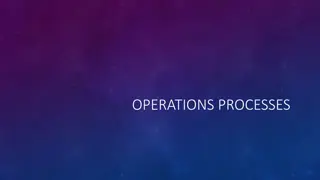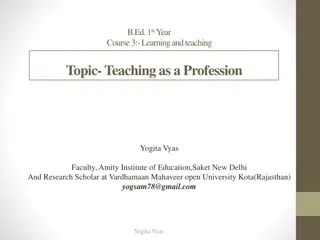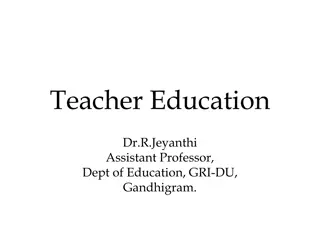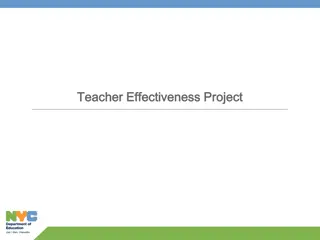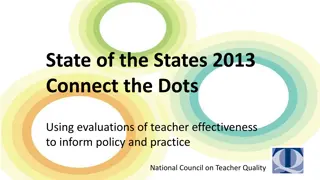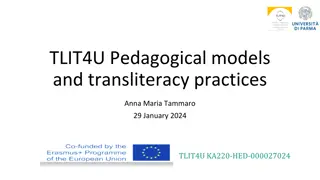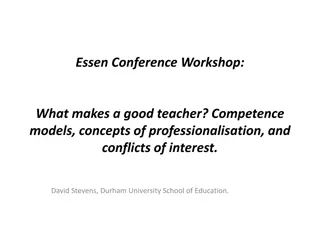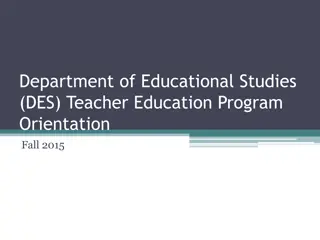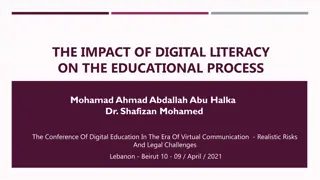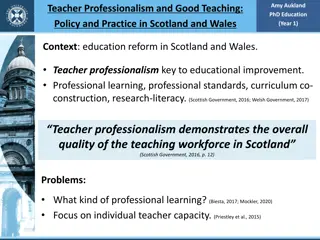Digital Teacher Education Project: Transforming Teaching and Learning
This project at the University of Warwick aims to enhance teacher education by focusing on quality, inclusivity, access, and cost-effectiveness. It addresses key frameworks and aims to expand impact and reach through strategic initiatives in mentoring, digital communities of practice, and more.
Download Presentation

Please find below an Image/Link to download the presentation.
The content on the website is provided AS IS for your information and personal use only. It may not be sold, licensed, or shared on other websites without obtaining consent from the author.If you encounter any issues during the download, it is possible that the publisher has removed the file from their server.
You are allowed to download the files provided on this website for personal or commercial use, subject to the condition that they are used lawfully. All files are the property of their respective owners.
The content on the website is provided AS IS for your information and personal use only. It may not be sold, licensed, or shared on other websites without obtaining consent from the author.
E N D
Presentation Transcript
UCET Presentation: Digital Teacher Education Project Wednesday 2 November 2022
Who we are Abi Ball Assistant Professor: Head of Technology Enhanced Learning in the Centre for Teacher Education (CTE) at the University of Warwick Project Facilitator, responsible for curriculum design processes, staff training and mentoring and research. Co-lead of Digital Communities of Practice strand. Lead of Reusable Learning Objects strand. Jonty Leese - Associate Professor Lead of Mentoring strand. Co-lead of Digital Communities of Practice strand. Secondary Computer Science lead at CTE
Where we were (Context) CTE has a long history of Teacher Education at the University of Warwick. Its programmes are underpinned by the core values of social justice, intellectual curiosity and creativity. At all levels, its programmes are connected to the Framework of Ethical Leadership in Education (as presented by the work of the Ethical Commission and the Chartered College of Teaching). The Initial Teacher Education programmes are the beginning of its students professional development journey. CTE prides itself on making a difference to its students. It places high-quality teaching and student support at the heart of what it does and recognises that its success is built on the strength of its partnership with its students and schools.
Why is the project important? ITT Core Content Framework. Market review process. Early Career Framework (ECF). Three-year (minimum) entitlement. Need to expand CTE s: Impact Reach Sustainability Good practice taken forward from the pandemic. Competition from other providers. Unique, one-off funding from Warwick s Academic Resource Committee (ARC).
Digital Teacher Education Project: Transforming Teaching and Learning in CTE Five-year strategic project. Transformation and enhancement of teacher education at CTE: Quality Inclusivity and access Increase geographic range of partners and WBL. Address cold spots and sparsity/supply issues. Achieve greater course cost effectiveness.
Mentoring Digital Communities of Practice (DCOPs) Reusable Learning Objects (RLOs) Student Experience & Quality Assurance Inclusion and inclusive teaching Inclusion and inclusive teaching Inclusion and inclusive teaching Inclusion and inclusive teaching Values and ethics Values and ethics Values and ethics Values and ethics Well-being Well-being Well-being Well-being Local PGCE enrichment Remote PGCE QTS growth Remote PGCE non QTS growth Remote CPD provision
Mentoring Aim: Support mentors (School and University based) and student teachers to be aware of best practice, engaging in deep coaching meetings. Focus: QTS formative assessment. Opportunity to align all school-based training with the CRD. Supports the trainee to take active ownership of their personal curriculum.
Key Impacts and reflections Creation of digital resources to support coaching for Teacher Trainees and Mentors across the Primary PGCE, Secondary PGCE and PGCi and iQTS programmes. In-school reflection and development of practice for Teachers and Trainees involved in recordings. Development of expertise within department relating to utilisation of digital platforms and their potential to enhance Teacher Training by developing reflection practices (Knight, 2021, Schon, 1987, Kolb, 2017, Brookfield, 2017 and slow looking , Pantaleo, 2020). Reflections: Cost-benefit in terms of time taken to capture, edit, catalogue, make accessible and disseminate need to be considered. Keeping the student experience at the centre and being mindful that digital is not always better, but that it can offer some bespoke solutions, particularly around evidence-based practice and a space to explicitly link theory and practice in a dynamic space. Future use permissions for recording children remains a significant barrier. This is crucial in establishing the impact of teacher moves on children and utilising the power of video not only with using content targeting a specific aspect of development, such as mentoring, but developing personalised learning involving ownership of video by mentor and trainee and reflections that are specific to that school, that group of children and that moment in the teacher training journey. This is where the most gains may lie.
DCOP (Digital Communities of Practice) Aim: Identify the ways that multiple users engage with and create a DCOP through shared domain, practice, and community. Focus: An outward facing site, bringing together stakeholders from University, schools and students is necessary for a DCOP to be established. A strong COP focuses on a shared problem, active learning and effective decision making.
Key Impacts and reflections It s ongoing work. Project finishing July 23. Identified specific groups. Doesn t always pan out as you thought. DCOP feel more organic.
RLOs (Reusable Learning Objects) Aim: To establish an evidence-informed process for developing, storing, sharing, and updating a collection of reusable learning objects that are built around the Warwick Teacher Values. Focus: The learning objects within this collection will reflect the core areas of the CCF and will be suitable for use on all our programmes.
Key Impacts and reflections Established RLO definition for CTE. Identified and shared existing RLOs. Delivered CPD sessions on developing RLOs (e.g., H5P, Padlet). PGCE-IQTS provided focus. Allocated time on staff development days. Provide examples. Best practice guidance.
Student Experience and QA Aim: To develop a more comprehensive understanding of potential approaches and related tools for student experience and quality assurance activities across local QTS, remote QTS and non QTS teacher CPD programmes. Focus: Professional Practice (or Work-Based Learning [WBL]) element of the programmes. This project includes an exploratory/developmental study of two portfolios relevant to work-based learning.
Key Impacts and reflections Integration of the project's studies in a range of programmes has resulted in quicker testing of approaches that use software to support work-based learning. Students and partners appreciate intuitive, innovative course/learning interfaces that save them work. Using multiple systems not tailored for a specific purpose moves us away from our core purpose. Seeking digital solutions to our courses that improve student experience.
Where we are (Nov 2022) Mentoring Creating resources which support mentoring practice in school. Embedding resources within mentor training and student teacher training. Having a positive impact on partner schools, through engagement with the University and through mentor buy in . Laying the foundations for utilising GoReact as a platform to capture, reflect and progress student teacher skills using video capture. Digital Communities of Practice Rainbow Allies identified as a potential DCOP. Successful Warwick Innovation Fund bid awarded to support the setting up the DCOP, encouraging engagement and using its development as an exemplar going forward. Identified gather.town as a possible solution for hosting online DCOP meetings and a room has been configured for this purpose.
Where we are (Nov 2022) Reusable Learning Objects Existing RLOs identified. Created a Reusable Learning Objects Repository in Moodle. Staff development sessions delivered. Staff supported through production of RLOs using H5P. Student Experience and QA Testing and evaluation of Mosaic. Piloting of Mosaic. Piloting of OneFile.
What we have learnt Challenges with central University systems and timelines. Timelines in general cannot be controlled (sickness, reaccreditation, unavailability etc. results in stop/start progress at times). Thorough planning results in quick uptake and rapid progress towards goals. Opportunities often coincide so that new ideas can be developed in flexible and innovative situations. Communication (within the Digital Team and more broadly) is paramount. Looking at our work in this way has revealed silos and duplications that we were not previously aware of. Intuitive solutions bring multiple benefits to partners, students, tutors and course leads.
Next steps Dissemination at a local (University), regional and national level required. Use the curriculum review reaccreditation as a chance to refresh our working patterns. Link this to our (CTE and University) medium term plans.
Thank you Any questions?
